|
At the October Logan County
Genealogical and Historical Society meeting, Jonathan Parker,
Operations Manager at the Lincoln Heritage Museum, provided the
program. The topic of Parker’s presentation was “The Trent Affair of
1861: A Diplomatic Crisis During the American Civil War.”
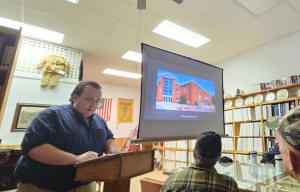
Parker has served as operations
manager of the museum since August. Before beginning the
presentation, Parker talked briefly about the mission of the Lincoln
Heritage Museum, which is “to interpret the life and legacy of
Abraham Lincoln and the world in which he lived.”
There is an outstanding base of volunteers. Parker said volunteers
at the meeting included Barbara Morrow, Kaylee Parker and Curtis
Fox. They help with the day-to-day operations of running the museum.
The Lincoln Heritage Museum is located at 1115 Nicholson Road on the
campus of the former Lincoln College. They welcome visitors on
Tuesdays, Thursdays and Fridays from 9:00 AM to 4:00 PM and
Saturdays from 1:00 PM to 4:00 PM. He called them proudly
old-fashioned because “we only take cash or check” but promise the
history is worth it.
Parker said the Lincoln Heritage Museum started as the Lincoln room
in 1941 thanks to a rather large donation of Lincoln artifacts from
Lincoln University alumnus Judge Lawrence Stringer. The collection
grew over time thanks to the generosity of other donors, most
notably Robert Todd Lincoln Beckwith, the last descendant of the
Lincoln family.
The Lincoln room grew too small to house the collections and in
2010, the Lincoln College Museum opened up within McKinstry Library.
Parker said the space became too small again and in 2014 the Lincoln
Heritage Museum was formed and given space in the Lincoln Center at
Lincoln college.
Lincoln Heritage Museum consists of two floors. Parker said the
first floor displays over 100 rare objects like furniture owned by
Mr. Lincoln and hand painted campaign banners from the 1860
election. The second floor features the immersion experience, which
takes visitors to Ford’s theatre on the night of Lincoln's
assassination. Visitors then travel with Lincoln as he lay dying at
the Peterson house. The rooms recreate Mr. Lincoln's life and times
and show the character of the man and president we know from our
history books was forged.

Parker said the Lincoln Heritage
Museum strives to be an educational resource to the community and
all are invited to learn from Lincoln and to live like Lincoln. He
invited everyone there to come visit soon.
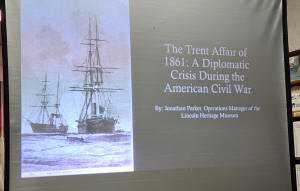
Parker discussed the details of the
Trent Affair of 1861, which was a diplomatic crisis Lincoln had to
face at the start of the Civil War. Parker then took everyone back
to one of the most dangerous moments of the Lincoln presidency. It
was a moment when the United States, already torn apart by its Civil
War, nearly found itself at war with Great Britain as well.
In 1861, Parker said the Civil War had just begun and the union was
fighting to preserve itself. The confederacy was desperate for
recognition as an independent nation, but Parker said the union was
anxious to stop the confederacy from being recognized at almost any
cost.
Charles Francis Adams, son of former president John Quincy Adams was
serving as the U.S. Minister to the United Kingdom at the start of
the Civil War in 1861. On November 12th, 1861, Adams received a
request for a private meeting with the British Prime Minister, Lord
Palmerston.
Parker said the invitation read, “my dear Sir I should be very glad
to have a few minutes conversation with you. Could you without
inconvenience call upon me here today at any time between 1:00 and
2:00?”
Foreign representatives typically met with the British Foreign
Secretary, so Parker said a summons from the Prime Minister himself
was very much out of the ordinary.
Lord Palmerston got straight to business when Adam showed up for his
appointment. Palmerston told Adams that the captain of the American
warship James Edgar had gotten gloriously drunk and bragged about
his plans to intercept a British ship bringing Confederate diplomats
to Europe. The British knew that the confederacy wanted their
government and the French government to officially recognize them as
an independent nation.
Parker said Palmerston let Adams know that any interception by
America of Confederate diplomats would probably not lead to any
good. Palmerston and Adams did not know that four days before on
November 8th, Captain Wilkes and the USS San Jacinto captured James
Mason and John Slidell, the Confederate diplomats, from the British
mail steamer Trent off the coast of Cuba.
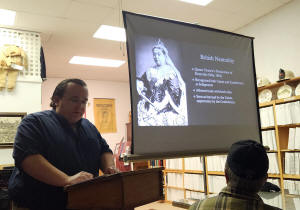
Queen Victoria issued the United
kingdom's declaration of neutrality in the American Civil War in May
1861 in response to President Lincoln's decision to blockade the
South's ports. Parker said the declaration named both sides as
belligerent. It allowed the British to trade with both the Union and
Confederacy. He said this recognition was the only important
concession that the United Kingdom made to the Confederacy during
the Civil War since the British never recognized the independence of
the Confederacy.
Parker said the United States saw Queen Victoria's declaration as a
betrayal of the United Kingdom's alliance with America and its
international opposition to slavery. The Confederacy was thrilled
with the Queen's declaration as they saw it as an opening to get
European powers to recognize them as an independent nation.

Recognition as a country would
allow the Confederacy to borrow from international lenders to fund
their war effort. Parker said a priority of the Confederate
government after this declaration was to send envoys to Britain and
France to lobby for full recognition of nationhood. Confederate
states were counting on the power of “king cotton” to bring Britain
to their aid.
Prior to the war, Parkes said Britain and the rest of Europe
imported a full 85 percent of its cotton from the Confederacy.
Nearly 20 percent of the British population earned its living from
the cotton industry and 10 percent of the country's capital was tied
up in cotton as well. Jefferson Davis and the Confederate government
felt that the war would be a short one and if it went on longer the
cotton famine would bring Great Britain into conflict to protect
economic interests and rescue the south from Union forces.
Parker said the Confederate diplomats, Mason and Slidell,
successfully ran the Union blockade aboard the USS Nashville as far
as Charleston and went from Charleston to Nassau in the Bahamas
aboard the ship Theodora. The men missed their connection with the
British ship to take them to Europe and sailed to Cuba hoping to
find a ship bound for England.
After three weeks, Parker said the men were finally able to book
passage on the RMS Trent when she was ready to sail out of Havana.
Captain Charles Wilkes of San Jacinto learned from a newspaper that
Mason and Slidell were in Havana and waiting to sail on the RMS
Trent, so Wilkes consulted with his first officer Lieutenant Fairfax
about the legality of removing Confederate envoys from a British
steamer. Wilkes and Fairfax decided the diplomats could be
considered contraband and legally seized.
The Trent left harbor in Havana on November 7th and was found by the
San Jacinto. Parker said Wilkes ordered two shots fired across the
bow of the Trent. The first shot was ignored but after the second
shot, the Trent stopped. Twenty heavily armed men were allowed to
board the vessel with the following instructions: should Mr. Mason,
Mr. Slidell or their secretaries Mr. Eustace and Mr. McFarland be on
board, make them prisoners and send them on board this ship
immediately and take possession of the Trent as a prize.
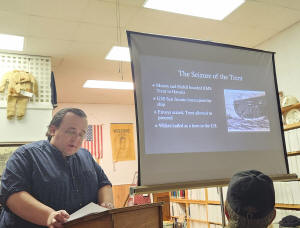
Parker said Fairfax was also
instructed to seize any dispatches and official correspondence he
might find. Fairfax did not wish to make the situation any worse
than it already was, so he chose to board the Trent alone. At first
Fairfax found the captain of that vessel to be uncooperative.
Fairfax was being threatened by the passengers and crew and had
little choice but to order his armed sailors to join him on board.
James Marr refused permission for the boarding party to search the
ship, but Parker said at this point Mason and Slidell came forward
willingly to avoid any bloodshed. Fairfax backed down as he realized
that searching the ship would have constituted a defacto measure of
the British vessel. Mason and Slidell formally refused to go with
Fairfax but offered no resistance when being escorted off the Trent.
There were no dispatches or any
papers of import on the two as the dispatches had previously been
given to the agent who had promised to deliver them to the
Confederate authorities in London. The Trent was then allowed to
proceed on to London.
Mason and Slidell went down to Fort Warren in Boston Harbor. In the
United States, Parker said Wilkes was hailed as a hero for his
actions and received a gold medal.
Others in the north worried the capture of Mason and Slidell would
lead to war. Parker said there were many comparisons made between
Captain Wilke’s actions and those of the British up to the War of
1812.
On November 27, when news broke in
London of the seizure of Mason and Slidell, Parker said the British
public and government were predictably furious. The British were
livid that the United States had disrespected their sovereignty.
At a cabinet meeting, Prime Minister Palmerston shouted, “I don't
know whether you were going to stand this, but I'll be damned if I
do.” Parker said Palmerston calmed down a bit after that meeting and
left the door open for a diplomatic solution.

[to top of second column] |

Palmerston wrote to Queen
Victoria a few days after and said if the Americans would
apologize, the result would be honorable for England and
humiliating for the United States.
In the meantime, Parker said all the United States Minister
Charles Francis Adams could do in the meantime was send letters
to Secretary of State Seward to let him know the mood in London.
Adams could not speak on behalf of the American government
without explicit instructions from
Seward. The only course of action available to minister Adams
was to wait and avoid Lord Russell.
Within a week of the Trent crisis taking place, Parker said
Secretary of War Sir George Lewis proposed sending 30,000 men to
Canada. Lord Palmerston instructed the Governor General of
Canada prepare for war saying such an insult to our flag can
only be atoned by the restoration of the men who were seized.
Everyone agreed something ought to be done in response to
America's
violation and British flag, but they couldn't agree on what
response to take William Gladstone Chancellor of the Exchequer
felt it was too strong of a response would leave the Americans
with no room to maneuver. Lord Palmerston considered it too weak
of a response and felt it gave the United States the wrong
impression of British resolve.
Parker said the cabinet decided to leave the drafting of the
government’s response to Foreign Secretary Lord Russell.
Russell's reply stated the facts of the case and demanded the
Americans restore the Confederate commissioners to the British
and issue a formal apology within a week of receipt of the
letter.
If the Americans refused to comply, Parker said Lord Lyons, the
British Ambassador to America would close the embassy and leave
for Canada and a de facto state of war would exist between
Britain and the United States. When the British cabinet
reconvened the next day to look at the draft letter, some felt
the meaning of the text was unclear and Russell became
defensive. Parker said the cabinet agreed to send Lord Lyons two
letters: one that outlined the basics of the case and the second
that contained the threat of war.
Within a week, Parker said more disagreement ensued and the
cabinet agreed to send two letters to the queen. The letters
arrived at Windsor Castle on November 30th. Prince Albert, Queen
Victoria’s husband, had been kept up to date with the cabinet’s
deliberations and was convinced that their reaction would be
overly aggressive. Parker said he was absolutely correct.
Prince Albert had a serious case of typhoid fever and was barely
able to hold a pen, but Parker said the prince amended the
proposed text. Prince Albert felt there should be the expression
of hope the American captain did not act on their instructions,
or if he did he misunderstood them. Prince Albert wrote that the
United States government must be fully aware that the British
government could not allow the flag to be insulted and the
security of her mail communications to be placed in jeopardy. He
wrote Her Majesty's government aren't willing to believe that
the United States government intended wantingly to put an insult
upon this country so the whole thing was a mistake, and it was a
rogue captain acting without any sort of instruction at all.
Parker said Prince Albert was hoping to get a suitable apology.
It was a loophole, and Parker called it an exit route that would
allow the American government to withdraw with honor. This was
the last document Prince Albert would ever sign as he collapsed
the next day and died twelve days later at the age of 42.
Lord Russell agreed with the prince’s changes, but Parker said
he still doubted that Seward would climb down. A third letter
written to Lyons outlined the presentation of Her Majesty's
demands and said above all the Confederate commissioners must be
released from prison. Parker said no apology would appease
Britain if they were kept in custody. There was to be no
bargaining on that point.
Parker said Steward got Lincoln to call a cabinet meeting for
Christmas Day and copies of Russell's letter were given to the
members. It soon became apparent most were against releasing the
Confederate envoys. Public opinion adored Captain Wilkes and to
release Mason and Slidell seemed like surrender. However, the
economic reality was grim because U.S. bonds were collapsing and
a war with Britian would be ruinous.
The cabinet adjourned in the afternoon agreeing to reconvene the
next day with Lincoln still clinging to the notion of
international arbitration of the crisis. Parker said Lincoln
asked Seward to present his arguments on compliance and writing
the next day and Lincoln would do the same for the arbitration
case.
By the next day, most cabinet members had come to Seward’s view
and the United States had little choice but to comply with
British demands which was very sensible. Seward had been up all
night drafting a 26 page response to Lord Russell in which he
clearly laid the blame on Captain Wilkes and his failure to take
the Trent.
Seward outlined his case then waited for Lincoln to make his for
arbitration, but the president said nothing and the cabinet
approved Seward’s proposal. When Lincoln was asked why he had
not made a counter argument, Parker said Lincoln replied, “I
could not make an argument that would satisfy my own mind.”
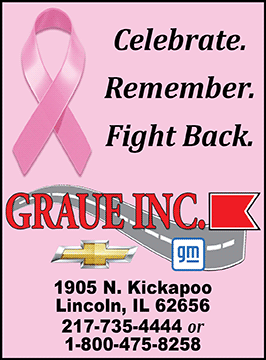
Parker said Steward’s official
reply complied with the basic demands of the Russell letter stating
Wilkes acted without orders. The captives would be released, but
there would be no formal apology. The envoys were contraband and
could be rightfully seized. Wilkes's error was in not seizing Trent
as well and taking it to a neutral port for judgment.
In a final poke at the British, Seward suggested that Wilkes by
impressing passengers from a merchant ship had merely followed
British practice not American, which Parker said was an echo of the
War of 1812. However, Steward said the United States wanted no
advantage gained by an unlawful action and as far as the nation was
concerned the captives were relatively unimportant.
Steward then concluded the four persons in question are now held in
military custody in Fort Warren, Massachusetts and they will be
cheerfully liberated. He asked Lord Lyons to please indicate a time
and place for receiving them. Lord Lyons accepted the diplomatic
overture of the United States. Parker said on January 3, 1862, Mason
and Slidell left for England.
In England, the American response was awaited eagerly and with some
trepidation. On January 8, 1862, the news reached London and spread
rapidly across the city. Parker said the press conveyed a sense of
relief with the Times commenting, “we draw a long breath and are
thankful we have come out of this trial with our honor saved and no
blood spilled.”
Parker said the Times judged Mason and Slidell “about the most
worthless booty possible to extract from the jaws of the American
Lion.”
Palmerston wrote to the queen reporting the humiliation of the
United States. Parker said Queen Victoria’s speech at the opening of
Parliament February 6, 1862, officially closed the Trent Affair and
she told them the question has been satisfactorily resolved. He said
the friendly relation between the Queen and the President of the
United States remained unimpaired.
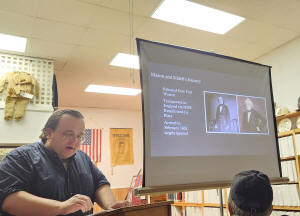
When Mason and Slidell arrived at
Southampton that February, Parker said Queen Victoria refused to
receive them. Their arrival after a long journey was barely reported
in the British press.
The soldiers Britian had sent to Canada at great expense remained
there for some time. Parker said they got bored with little to do.
Some even went to America and joined the union army.

The South gained little from the
Trent Affair. Parker said in late February, the British government
issued a report acknowledging the effectiveness of the Union
blockade.
After a debate in the House of Lords on March 10, Mason sent one of
his first dispatches to Richmond reporting the blockade was
effective and no step would be taken by this government to interfere
with it.
With the Queen’s honor defended and a cheaper alternative to
southern cotton located in India, Parker said Great Britian could
afford to stay on the sidelines while the Americans killed each
other.
In the end, Parker said the inherent good sense of Prince Albert,
Lord Lyons and William H. Seward had avoided the looming threat of
war between the United States and Great Britian. It also allowed
Abraham Lincoln to fight one war at a time.
Next, Parker asked if anyone questions.
Curt Fox asked about the importance of the Confederate diplomats and
if there was any diplomatic immunity.

Parker said the men were “a
middling sort of Southern aristocrat.” If the Confederacy had been
recognized as an independent nation, he said there would have been a
sort of diplomatic immunity. Since no one recognized the Confederacy
as a nation, there was no such protection.
Diane Farmer asked how Queen Victoria felt about slavery. Parker
said the queen abhorred slavery and racism.
Monday, November 17, the Logan County Genealogical and Historical
Society will have its annual dinner meeting. It will be held at the
Lincoln American Legion’s Mary Pat room. Doors open at 6 p.m. with
dinner at 6:30 p.m. Reservation forms can be picked up at the LCGHS
building on 114 N. Chicago on Tuesdays, Thursdays or Fridays between
11 a.m. and 3 p.m. Forms and a payment of $25 for the dinner can be
mailed or dropped off and need to be in by Wednesday, November 5.
The program that evening will be presented by Bill Furry of the
Illinois State Historical Society.
[Angela Reiners]
|